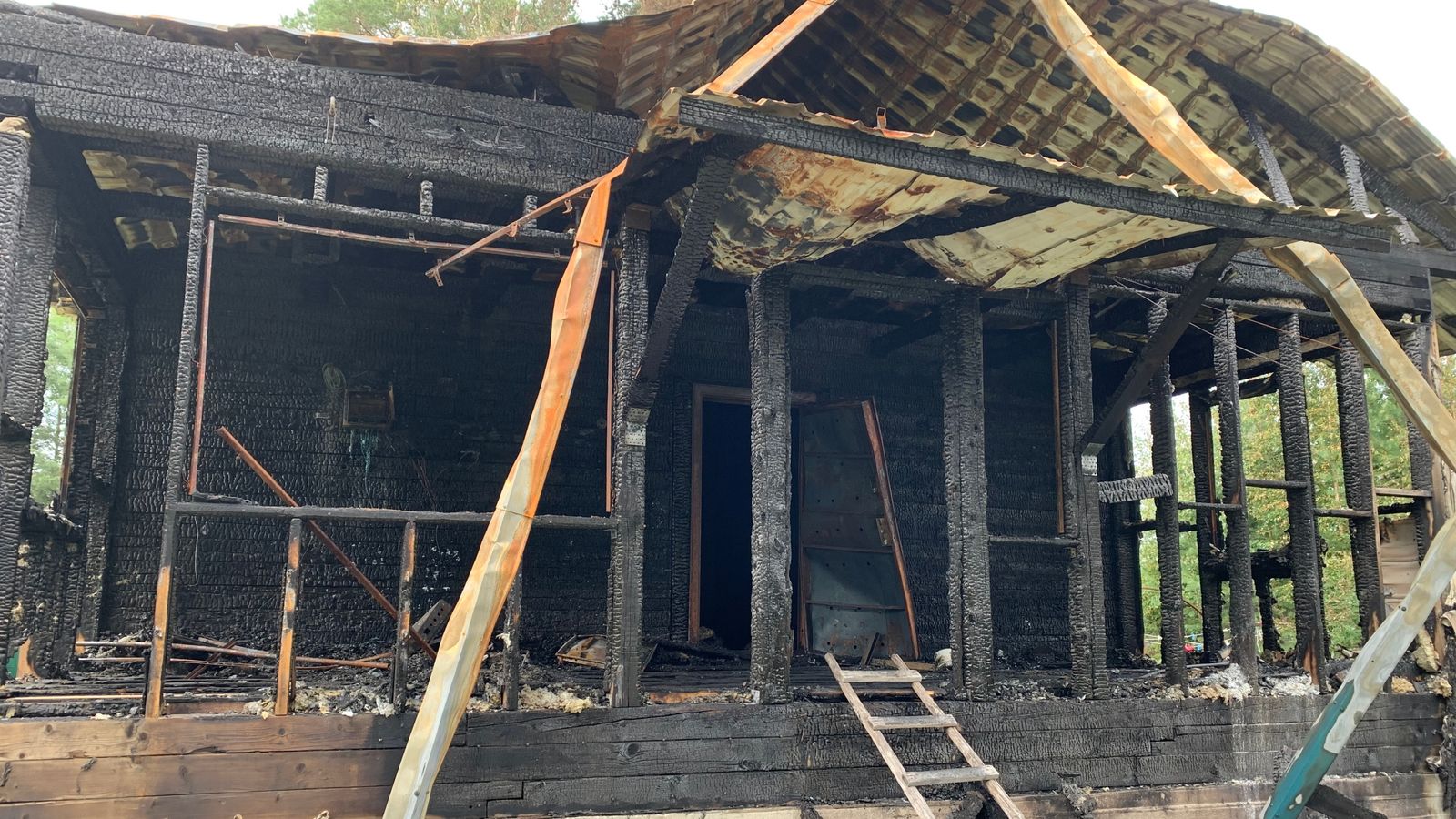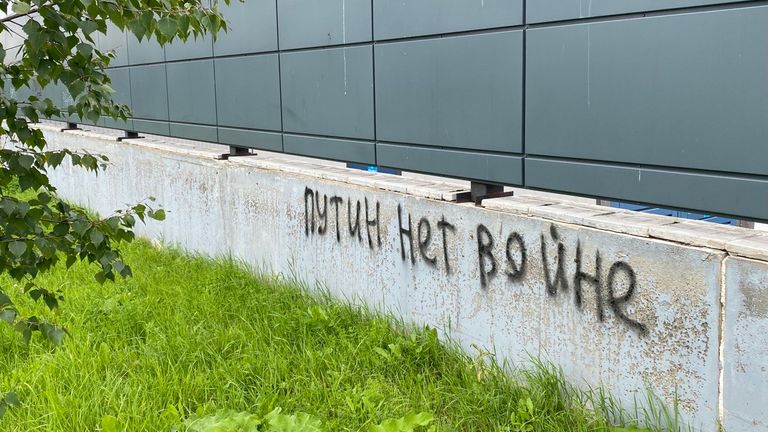The village of Derevyannoe in Karelia, northwest Russia, has a well-kept feel to it. Apple trees heavy with fruit and tidy vegetable gardens, boats on trailers ready for sailing in the nearby lake and wood stacked up high for winter.
Up above you can just about make out the sound of woodpeckers tapping away in the pine forest canopy as dogs bark fiercely behind corrugated iron. It does not look like a place for mass murder, but where does.
Irina Zhamoidina stands in front of the charred remains of her brother, Artyom Tereschenko’s home. He and her 71-year-old father, Vladimir, were murdered here on the night of 1 August when two men, both of them ex-convicts, one fresh back from the frontline, broke in and stabbed father and son to death before setting the property on fire.
Mr Taroschenko’s children, aged nine and 12, managed to escape through a window and raise the alarm.
“My dad definitely did not deserve such a death,” Ms Zhamoidina says quietly. “We are from a good family. This is not how he should have died.”
The two men then continued down the road to another house a few hundred metres away and killed all four who lived there, three men and a woman, before setting their house on fire too. A drunken binge with a dose of drugs mixed in, Ms Zhamoidina thinks – a ‘zapoi’, as they’re known in Russia – turned murderous one sleepy summer night.
One of the men, Maxim Bochkarev, was known locally as a troublemaker. He had served time at a prison colony in St Petersburg for theft, carjacking, rape and sexual assault which is where he met his partner in crime, Igor Sofonov.
Sofonov, 37, had three more years to go for theft, robbery and attempted murder but was recruited straight from jail by Russia’s Ministry of Defence and sent to Ukraine, a practice started by the late Wagner boss Yevgeny Prigozhin and adopted enthusiastically by the Russian military.
“I believe that anyone who was in prison, even if he went to war, then he should be sent back when he was done for such serious crimes,” Ms Zhamoidina says. “They should not live among us because cases like this do happen.”
She is right. The catalogue of violent crimes committed by pardoned ex-offenders is picking up as they trickle back home.
In June, Prigozhin said 32,000 recruited by Wagner were heading back to Russia, their records wiped clean.
Already in the southern city of Krasnodar, a Wagner ex-convict is on trial for murdering two people on their way home from work, a charge he denies. There have been cases of murder, sexual assault, child molestation from convicted sexual offenders.
In Novy Burets, about 500 miles east of Moscow, a Wagner ex-convict murdered an elderly lady, again on a drunken binge, even after locals repeatedly expressed their alarm to authorities that he was wandering their streets.
Read more:
Prigozhin’s ‘death’ seems to reveal a Russian principle
How Russia may seek to exploit crisis-hit Niger
Three years ago we travelled to the Siberian city of Kemerovo to cover a case of domestic violence which had culminated in the brutal murder of 23-year-old Vera Pekhteleva. Her story had shocked the country after the audio recordings of her screams, as neighbours made repeated, desperate calls to police, went viral. In court, her uncle had sat just metres away from the killer, Vladislav Kanyus, as he was sentenced to 17 years in jail. Now from social media photos, he knows that Kanyus is a free man, recruited by the Ministry of Defence and serving somewhere in Ukraine.
“He murdered her with extreme cruelty,” Mr Pekhtelev said. “He was tormenting Vera for three hours, and now he will have been trained to fight. I just can’t imagine what will happen if he comes back.”
Changes to Russian legislation in June propose allowing suspected or convicted criminals to fight but not once a verdict takes effect. The reality of Russia’s prisoner recruitment though seems a lot murkier. According to the UK’s Ministry of Defence, it is part of a “broader, intense drive by the Russian military to bolster its numbers, while attempting to avoid implementing new mandatory mobilisation, which would be very unpopular”.
It is a policy which will see hardened criminals, traumatised by war, returning in their thousands with precious little in the way of psychological support or rehabilitation to speak of. Just as with domestic violence in Russia, authorities do not engage sufficiently with these kind of social issues back home, and especially not when there is a war on. But this is the stuff which tears at the social fabric of towns and villages across the country. This is one more of the many unintended consequences of war. Beyond the the zinc coffins and the escalating drone onslaught, this is how war comes home.
Alexandra Sofonova, Igor’s sister, believes the state should give psychological support to men like her brother, but she is sure that it won’t. “He served his duty, he was wounded – he’s a man and they’re proud of things like this. And then he came back and turned out to be unnecessary, he couldn’t even get a passport, he goes to glue wallpaper. Maybe something clicked in his head”, she says.
On the back of a supermarket wall a few feet from where we sit there is a piece of graffiti scrawled in large black letters. “Putin, no to war,” it says. I ask Alexandra what she thinks about it.
“I don’t know what kind of special operation this is,” she says. “Many of my friends died and are returning in zinc coffins. But they are dying for nothing. What are we fighting to win?”
The other sister in this story, Irina Zhamoidina, whose men were murdered back home, says it is her faith in God which gets her through each painful day.
“I’m afraid for the whole country. No one has the right to kill another, to take a life. They were not given this right”, she says. “We must stop this somehow, so that these kind of people are not among normal society.”







